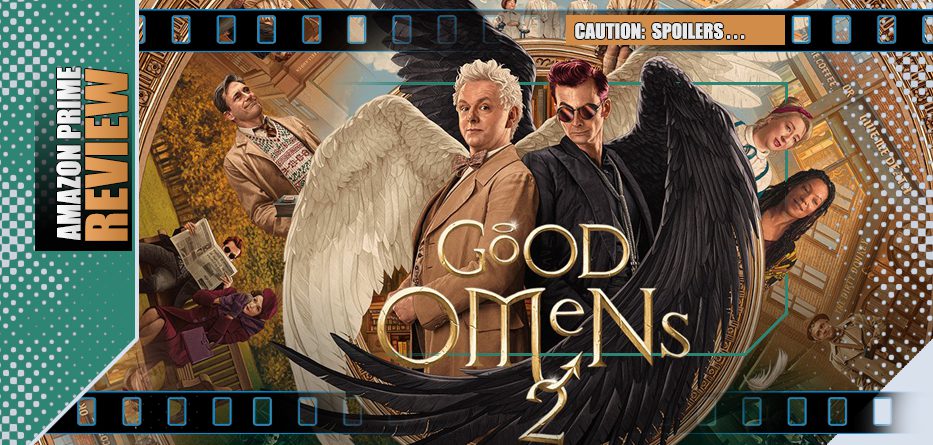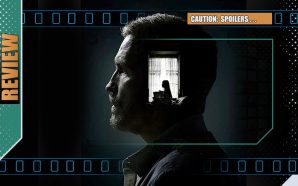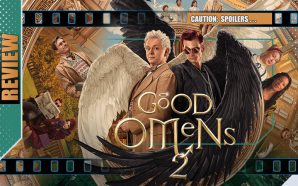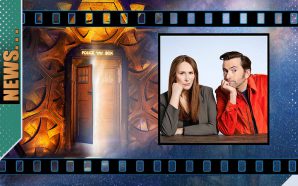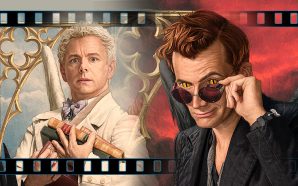Crowley (the demon) and Aziraphale (the angel) averted the coming of the Ant-Christ and have since tried to keep themselves off the Heaven and Hell radar. That means a minimum of miracles. However, when a naked man who looks awfully like the angel Gabriel, enters Aziraphale’s bookshop it can only be the start of some cosmic-level trials and tribulations. ‘Gabriel’ doesn’t remember who he is or why he’s there but as word spreads high and low about his disappearance from Heaven, Crowley and Aziraphale realise they’re going to have to hide him while they work out what’s going on.
And if there weren’t ecumenical emergencies, then there’s the mission to move Heaven and Earth and bring fellow shop-keepers Maggie and Nina together. But if love really is the most powerful force in the universe, can it stand against demonic hordes, Nazi zombies and the dewy-decimal system? Every day, that answer is getting closer and it’s going faster than a roller-coaster…
*spoilers*
From its subject-matter, irreverent delivery and distinct visual flourishes, this all feels like Harry Potter meets the Hitch-hikers Guide of the Galaxy. That latter tome’s author, Douglas Adams, had a habit of taking big ideas and puncturing their air of superiority with a needle of satire but occasionally tripped over the all-knowingness of his own showmanship. The late Terry Pratchett (Discworld etc) was arguably far more seductive and accessible to all ages, being sly and even silly without the need to impress and yet he won as many fans across generations. Neil Gaiman, of course, is another modern magus of fantasy, his work (Sandman) edged with darker hues and even older magics…. so, anything on which the two men collaborated was almost predestined for greatness. Plenty of Pratchett adaptations didn’t hit their intended target, but with Gaiman involved in the first Good Omens, the portents always looked good.
But another adventure? A second bolt of lightning in the same bottle, another storm in the tea-cup of elevenses? Sequels, they say, are often far from equals. Yet, Good Omens 2 relishes the challenge and sets up more shenanigans. The central story of ‘What the he** happened to Gabriel?‘ is fine as an initial conceit to get things going, but really it’s just a line on which to hang an assortment of other tales and at times you can feel the story meandering to avoid a speedy conclusion. However, each of the denominational detours work well enough, skimming like an anarchic stone through history with Crowley and Aziraphale providing near-hits and near-misses to important moments on Earth and beyond.
The first season of Good Omens was about the end of the world, assembled from the structure of the original book and given momentum by the wishes of Pratchett that Gaiman should continue being involved with bringing it to the screen. Here there isn’t that specific grounding, but more a sense of spiritual kinship. Oh, there’s still talk of armageddons and cosmic upheaveals and Heaven and Hell are both hypocritically unaware of their management systems, but they’re essentially all backdrop and backstory with the second season more an anthology of ideas (Grave-robbing, Nazi zombies, cosmic juke-boxes) collected together in a demonic dewey-decimal system of moral quandaries. No, more than anything, Good Omens 2 is simply about the power of love in all its awkward, deniable, triumphant, tragic shapes. There’s no doubting the strong, primal connection that Crowley and Aziraphale share – especially by the end of the last episode – they’re soul-mates… but that’s a bond that’s existed for millennia whether they admit to it or not. We also have other couples here: Maggie (Maggie Service) and Nina (Nina Sosanya) are the two fellow shop-keepers in the street who may or may not also be soul-mates and who our two heroes try to bring together, partly out of covering for their own dodgy miracles. (Service and Sosanya, you’ll remember, played different characters involved in a certain baby-swap last time around). There’s also another hevane and Hell match, but you’ll have to watch the full season to see it revealed.
There’s a mountain of whimsy here, some of it subtle and some of less so, but also a ton of heart. Yes, there are times when the meta-full in-jokes and the sly winks to the knowing audience flow perhaps a little too fast… especially if you’re a fan of Doctor Who. David Tennant was, of course, the Tenth Doctor (and is about to be the Fourteenth is some way shape or form) and while Tennant is as versatile and he is prolific, here he’s asked to channel the requisite slink, slide and gurning and impish-glee that won him the Gallifreyan role and give it the devilish flourish he showed in the first Good Omens. Gaiman has written for Doctor Who twice, Michael Sheen has provided his Welsh cadence to a Who bad-guy (and would still make an excellent Time Lord himself). The second episode is positively overloaded: Tennant’s father-in-law Peter Davison (The Fifth Doctor) and son Ty (seen recently in House of the Dragon) appear and in later episodes there are plentiful references to Doctors that are more than coincidental – with even an unpublished Doctor Who annual being offered as a bribe. There’s even a fez. Sometimes the subtext is just the text and fan-service fans the flames…
Tennant and Sheen continue their wonderful chemistry – established in Good Omens but also continued in their ongoing COVID mocumentary Staged – and if everything else eternally swirls around them, then fans will likely be satiated by that sparky, snarky bond they’ve perfected. John Hamm has long proven he’s willing to be the straight-man to the self-deprecating joke and from his first moments on screen until the last, he completely devotes himself to being kicked while down. Service and Sosanya are both great as characters who are sometimes far more insightful than our heroes and the supporting players such as Miranda Richardson (as Jaxx) Quelin Sepulveda (as Muriel), Doon Mackichan (as Michael), Shelley Conn as Beelzebub, Liz Carr (as Saraqael), Gloria Obianyo as Uriel and Reece Shearsmith (as Furfur) rise to their respective challenges. Mark Gatiss and Steve Pemberton are in zombie League of their own and Frances McDormand briefly reprises her role as God (albeit in some ADR work). The great Derek Jacobi also swoops in to steal a few scenes in the finale (as the Metatron).
Without spoiling anything, the series doesn’t finish as neatly as some might hope – the Gabriel situation is resolved but we leave Crowley and Aziraphale in an awkward place, heading (literally) in different directions, though saying some things that they both should have expressed long ago if not quite hearing each other in the process. The show yanks our heart-strings into knots in a way that a pre-scandal Joss Whedon would have delighted in – but makes a third run all the more essential as well as existential.
There’ll be some who don’t like this second season as much as the first, but the reverse will be true as well. There are fair reasons for both viewpoints – this feels like a worthy follow-up but like a welcome indulgence rather than written-on-stone-tablets inevitable. It’s not quite all-ages… the subject-matter is multi-layered and a few bits of adult language creep in, but one suspects kids today will hardly notice and it’s not there to shock. A few purists who’ve wandered in without seeing the original may sniff at the religious representations here but, frankly, faiths that have existed for centuries and millennia should be able to withstand a few satirical knocks or give up their holy ghosts… and if the idea of a universal soul-mate love being stronger than mere gender offends, then you’re likely already in a purgatory of your own making.
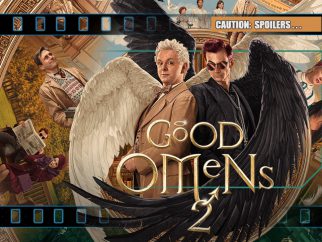
- Story8
- Acting9
- Direction9
- Production Design / VFX10

